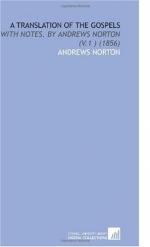|
This section contains 295 words (approx. 1 page at 300 words per page) |
Dictionary of Literary Biography on Andrews Norton
ANDREWS NORTON (31 December 1786-18 September 1853), editor and Biblical scholar, was born in Hingham,Massachusetts. He attended Harvard College and studied with the Divinity faculty, graduating in 1809. He taught one year at Bowdoin College before returning to Harvard as a tutor and librarian. In 1819 he was appointed Dexter Professor of Sacred Literature, a post he held until 1830. Norton married into Boston society in 1821 and, with the former Catharine Eliot, moved to "Shady Hill," his house in Cambridge. Their son, Charles Eliot Norton, later became a distinguished scholar. Norton died at Newport, Rhode Island. Norton's life work was to demonstrate the validity and accuracy of the Bible. His The Evidences of the Genuineness of the Gospels, 3 vols. (Boston: J. B. Russell, 1837-1844), analyzed the language and culture of biblical authors to defend the Bible's claim to divine inspiration. This work, his position at the Divinity School, and his editorship of the influential North American Review, all helped establish Norton as a major force in American Unitarianism. Therefore, when Emerson's "Divinity School Address" was delivered in 1838, Norton felt called upon to answer its charges that the miracles of the New Testament did not actually happen. His A Discourse on the Latest Form of Infidelity (Cambridge: J. Owen, 1839), as well as his newspaper attacks on Emerson and George Ripley, proved an embarrassment, as Norton challenged the qualifications of his critics, both former students of his at Harvard, while ignoring their substantive arguments. Unfortunately, Norton is remembered more for this debate, which made even the conservative Unitarians uncomfortable, than for his other real accomplishments. His Internal Evidences of the Genuineness of the Gospels (Boston: Little, Brown, 1855) came after many of his ideas had been passed by; his Verses (Boston: privately printed, 1853) are conventionally moralistic and of little note.
|
This section contains 295 words (approx. 1 page at 300 words per page) |


